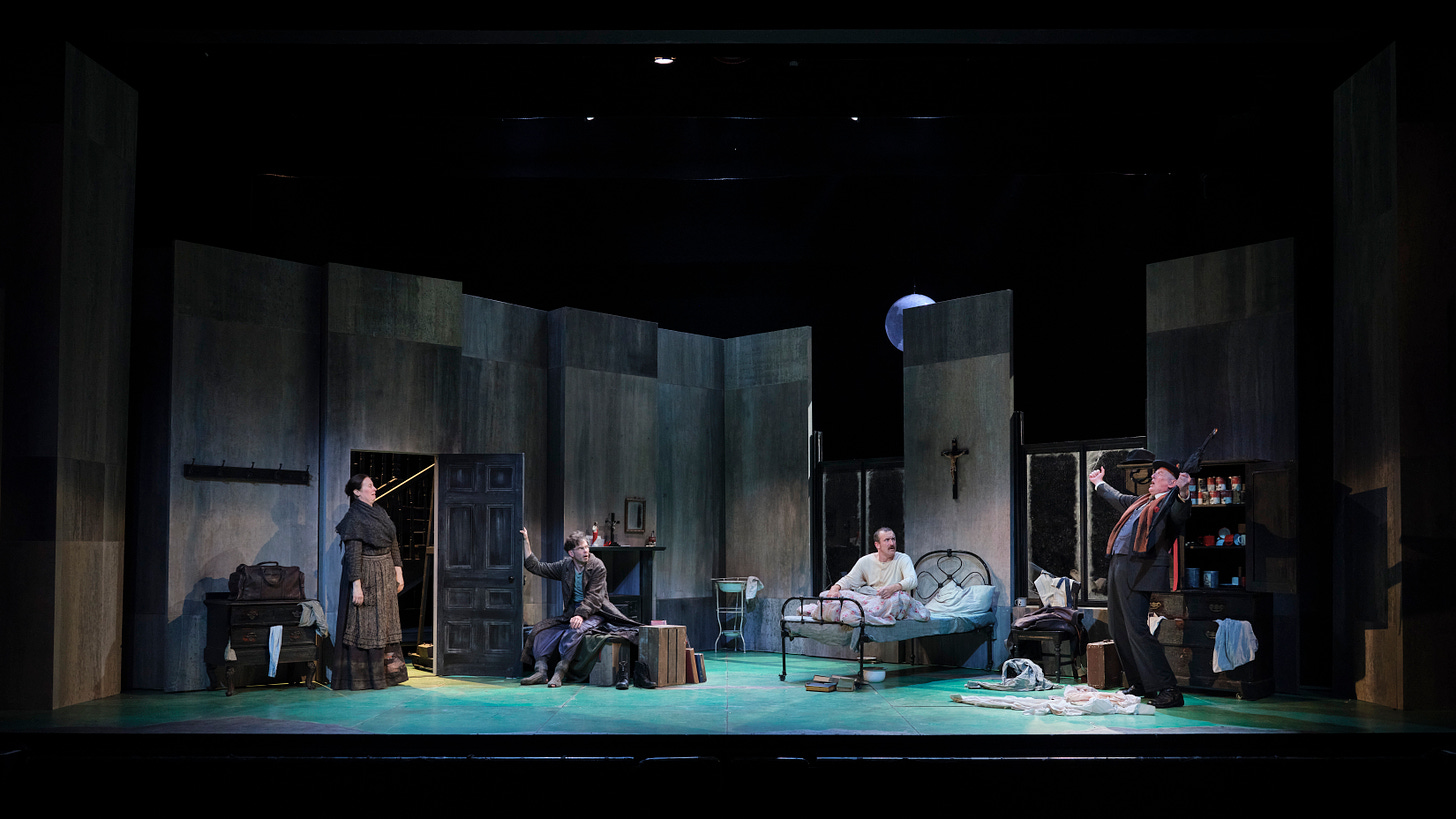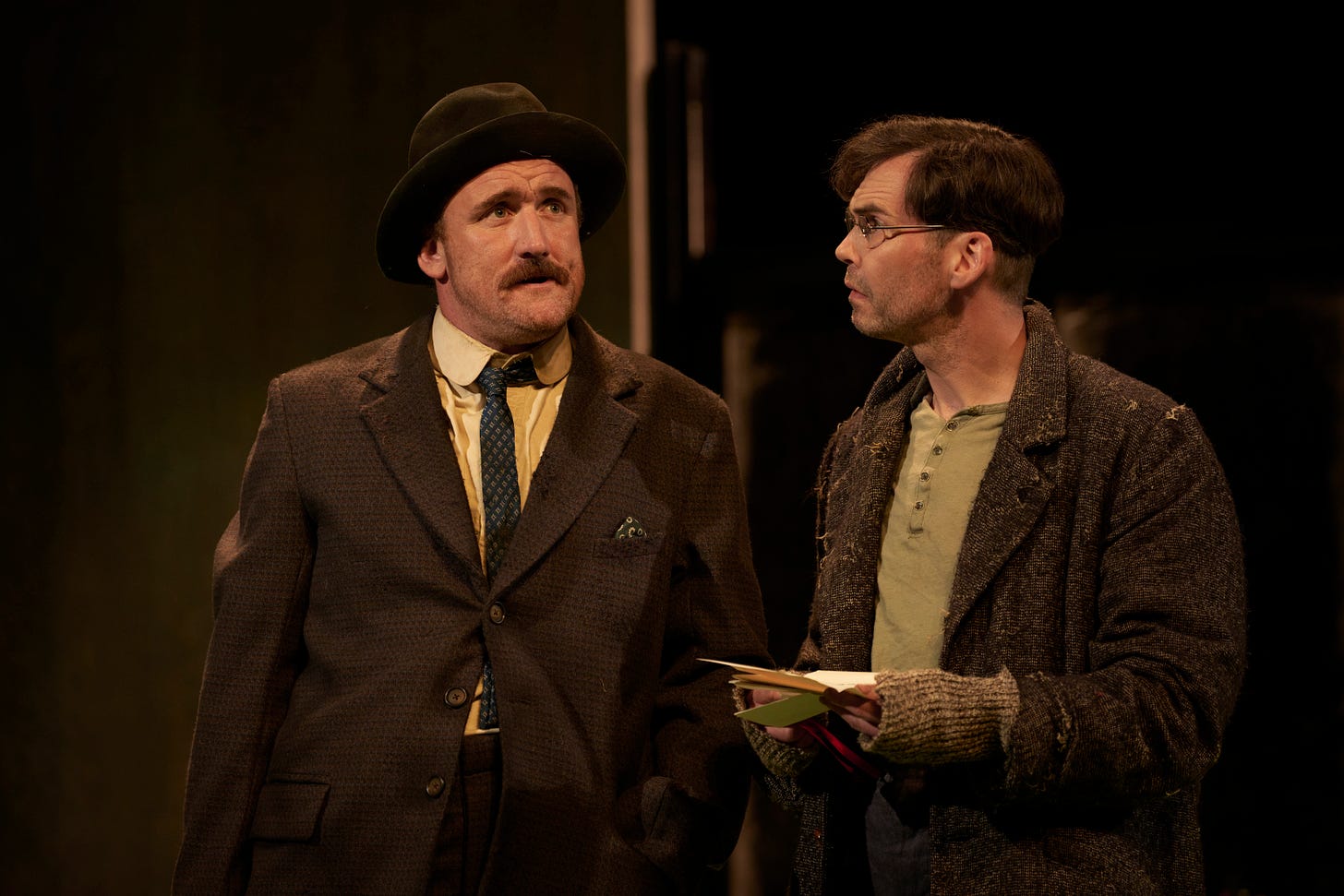Theatre review: Shadow of a Gunman
The Druid brings Sean O’Casey’s blockbuster to The Everyman. In its own way it shows what's working and not working in Irish theatre.

Set in 1920 during the War of Independence, Sean O’ Casey’s ‘Shadow of a Gunman’ tells the boisterous story of communal life inside impoverished Dublin tenement flats, where poet Donal Davoren and his lackadaisical roommate Seamus Shields, try in vain to hide away from the chaotic events unfolding outside the four walls of their lodgings.
Unfortunately for the two uneasy compatriots, both of whom are desperate to avoid being called into any sort of action; they are never quite able to escape the unwelcome intrusions that life in the slums invariably brings to their door.
Directed by Garry Hynes, this latest staging by Druid Theatre of O’ Casey’s tragicomedy, is a stylish and faithful production of a much celebrated dramatic evocation, which like a lot of the controversial playwright’s work, goes big in its quest for laughter and leaves the sense of tragedy to be tagged on towards the end.
The two protagonists, Davoren and Shields, played by regular Druid ensemble members Marty Rea and Rory Nolan, could easily be described as a pair of modern day snowflakes, each happy to take shelter indoors and showing no intention to attempt to change their current circumstances.
Having withdrawn from society and feeling devoid of any responsibility to engage in the conflict surrounding them, both are puffed up by their own misguided feeling of intellectual superiority; full of big ideas, but short on anything resembling purposeful action.
Rea’s performance as the woe is me, troubled poet is exemplary. He prances across the stage with his long coat flailing below his waist, at turns, full of a brash exuberance or heaps of self-pity. In many ways he’s reminiscent of the character Richard E. Grant plays in Withnail & I and the audience only sees his true nature when the stakes are raised towards the end of the play.
Nolan for his part, is more the inner city know it all, who having lost his role as an Irish teacher, is now reduced to the life of a petty peddler and has turned to religion and superstition to get him through the days and indeed, long sleepless nights.
The appearance of the excellent Caitríona Ennis in the role of Minnie Powell, really elevates the production as her scenes with Rea exhibit a wonderful flexibility, as she flits between the role of the flirting, doting and impressionable young girl to the strong minded woman of action, who is willing to be brave in the face of adversity.
Like all the other residents, she too has mistaken Davoren to be an IRA gunman on the run and is taken in by his eloquence and supposed derring do. In reality he and Shields lack the necessary gumption to grab a hold of life and it is the “ignorant” and more simple minded residents of the area, who show themselves to possess the vitality that the two layabouts like to fancy themselves to be imbued with.
There is a lot of comedy and humour in this production, but the overly coordinated physical movement of the characters, while well done, veered towards slapstick and at times this gave an impression that the actors were stretching for laughs, instead of being given the confidence in their ability to generate their own.
Another issue was the lack of any real sense of the impoverishment or squalor that were the day-to-day living conditions of that time and it was left to the imagination of the audience to envisage the terrible filth and grime of inner city Dublin, as the set was far too clean looking and the clothing of the characters more shabby chic than downtrodden.
Overall however, this was an enjoyable show but by no means exceptional. There is a tendency to greet any bigger production appearing in The Everyman as a triumph, but while there were plenty of questions to be pondered at the end of this play, it didn’t feel like the audience had been really moved by what they had seen.
Unfortunately, it’s all too rare for plays of this size to be seen on stage nowadays on a regular basis outside of Dublin and as a result it is hard for them to live up to expectation. They are, of course, expensive to produce and as a result the funding authorities are more keen to spread the risk across the board when it comes to distributing money to theatre makers.
This is a cause of a great divide, where a few established companies get the majority of funding to put on big shows and a lot of the money that is left to compete over, is then served up to audiences as plays lacking in any great scope or depth.
There is certainly a conversation to be had within the theatre community about this continued splintering of resources as writers, directors and actors are all vying to make their own work as opposed to coming together and finding creative solutions to stage bigger, more ambitious productions.
‘Shadow of a Gunman’ is sold out at The Everyman but other shows across the country are available here.
Pádraig O’ Connor is a writer based in Cork.
Theatre review: Dances Like a Bomb
Taking its title from a poem by Emily Dickinson, Junk Ensemble’s latest offering ‘Dances Like a Bomb’, features Finola Cronin, a former dancer in the renowned Tanztheater Wuppertal and Mikel Murfi, a Lecoq trained actor, who together play an aging couple trying to come to terms wi…






